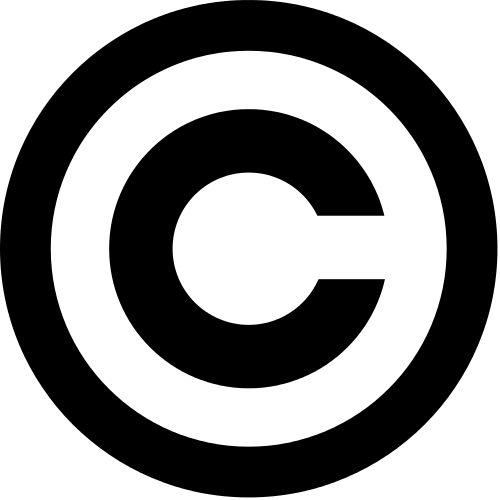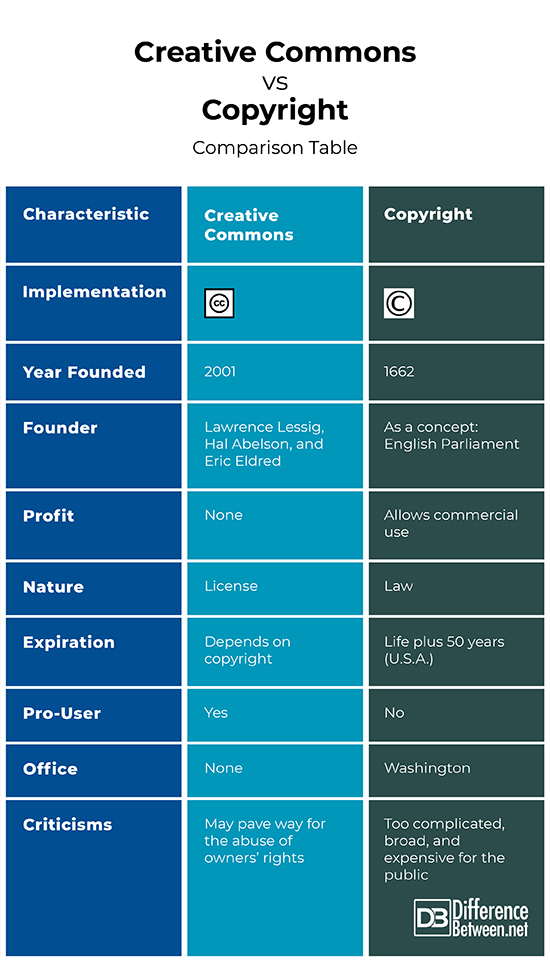Difference Between Creative Commons and Copyright
Creative commons and copyright both refer to legal explanations and sanctions regarding authorship. Both authorizations refer to creators’ conditions regarding their original outputs such as books, websites, software, movies, and songs. However, creative commons is only applicable to those protected by copyright while copyright covers original work. The following discussions further delve into these distinctions.

What is Creative Commons?
Creative Commons (CC) aims to increase the number of legally available creative works. This American non-profit organization has largely benefitted the masses by releasing free of charge materials. CC licenses give creators the freedom to decide which rights are being reserved and waived. It is currently being incorporated in popular online platforms such as YouTube and Flickr. CC licenses are based upon copyright specifics and only utilize one page of highly comprehensible explanation of rights.
CC was founded by Lawrence Lessig, Hal Abelson, and Eric Eldred in 2001. Lessig is an American activist, attorney, and Harvard law professor; Abelson is an Electrical Engineering and Computer Science professor at MIT as well as a co-founder of Free Software Foundation; and Eldred is a literacy advocate and the owner of Eldritch Press. The CEO is Ryan Merkley, previously the COO of Mozilla, who joined the organization in 2014.

What is Copyright?
Copyright grants authors the exclusive rights regarding the use and reproduction of their original work. This legal right started with the advent of the printing press as a reaction to the printers’ unjust controls. With the Licensing of the Press Act 1662, the English Parliament addressed the unauthorized printing of books and pamphlets. This legal concept was then adapted by various countries.
Copyright is one of the group of laws under intellectual property which immediately applies to any novel work which facilitates authors’ selling activities. However, when an employee gets paid for creating a certain material, the employer often gets the copyright. An infringement of copyright occurs when an owner’s product is reproduced without permission. Interestingly, copyright registration is not needed in most countries; however, many authors still opt to register for marketing purposes.
Difference between Creative Commons and Copyright
Implementation of Creative Commons vs. Copyright
Creative Commons is only applied to already copyrighted materials as it is a license which specifies the author’s conditions regarding the baseline permissions of reproduction, distribution, display, and performance. On the contrary, copyright instantly applies when a work is originally created; this is why it is described as “magical”.
Symbol of Creative Commons and Copyright
The logo of Creative Commons is while that of Copyright is .
Year Founded
Creative Commons was founded in 2001 in the United States while Copyright as a concept was first legally implemented through the Licensing of the Press Act 1662 in the United Kingdom.
Founder
As Creative Commons is an organization, it was founded by Lawrence Lessig, Hal Abelson, and Eric Eldred. On the other hand, Copyright is a law and it was first passed as the Licensing of the Press Act 1662 by the English Parliament.
Profit
Creative Commons, a non-profit organization, lets other people copy and use a creator’s work for noncommercial purposes only. However, Copyright allows commercial goals, hence profit, to be achieved. The author may also lend or assign the copyright with the pertinent signed contracts.
Nature
Creative Commons is an organization and a license which can take the forms of differing attributions while copyright is a law which allows owners to license their work.
Expiration
The licenses of Creative Commons expire when the elemental copyright also expires. As for Copyright, the US constitution mandates that it expires 50 years after the author’s death. However, this may vary in other countries, for example, the UK regulation dictates the expiration to be 70 years after the author’s death.
Pro-User
Creative Commons shows more advantages to the user as it allows free reproduction and utilization under certain circumstances. On the other hand, Copyright features more advantages to the owner regarding protection and commercial use.
Office
As what is on their website, Creative Commons does not have an office and they can be most conveniently contacted online. As for the U.S. Copyright office, it is located in Washington, D.C.
Criticisms
Some are critiquing Creative Commons regarding abuse of the creators’ rights as it paves way for spammers and plagiarism. On the other hand, the U.S. Copyright law is seen by some as too complicated, expensive, and broad that it discourages creativity and practical use for the masses.
Creative Commons vs Copyright: Comparison Tabe

Summary of Creative Commons verses Copyright
- Both authorizations aim to protect creators’ outputs such as books, websites, software, movies, and songs.
- The symbol of Creative Commons is while that of Copyright is .
- Creative Commons is an American non-profit organization which has largely benefitted the masses by releasing free of charge materials.
- Copyright grants authors the exclusive rights regarding the use and reproduction of their original work.
- Creative Commons applies to copyrighted work while Copyright immediately applies to originally created work.
- Creative Commons was founded in 2001 while the first Copyright law was in 1662.
- Creative Commons is a non-profit organization which advocates free use while copyright is employed for commercial use.
- The expiration of Creative Commons license depends on the expiration of the underlying Copyright while Copyright in America expires 50 years after the author’s death.
- As compared to Copyright, Creative Commons is more pro-user.
- Copyright’s office is in Washington while Creative Commons does not have an office and can be reached online.
- The main criticism for Creative Commons is its possibility to be abused and that it may jeopardize authors’ rights while that of Copyright is its being not so accessible, understandable, and affordable.
- Difference Between Hematoma and Melanoma - February 9, 2023
- Difference Between Bruising and Necrosis - February 8, 2023
- Difference Between Brain Hematoma and Brain Hemorrhage - February 8, 2023
Search DifferenceBetween.net :
Leave a Response
References :
[0]Fishman, Stephen. Copyright Handbook, The: What Every Writer Needs to Know. Berkeley, CA: Nolo, 2017. Print.
[1]Fitzgerald, Brian. Open Content Licensing: Cultivating the Creative Commons. NSW: Sydney University Press, 2007. Print.
[2]Stim, Richard. Patent, Copyright, and Trademark. Berkeley, CA: Nolo, 2017. Print.
[3]Image credit: https://upload.wikimedia.org/wikipedia/commons/thumb/b/b0/Copyright.svg/500px-Copyright.svg.png
[4]Image credit: https://en.wikipedia.org/wiki/Creative_Commons_license#/media/File:Cc.logo.circle.svg
